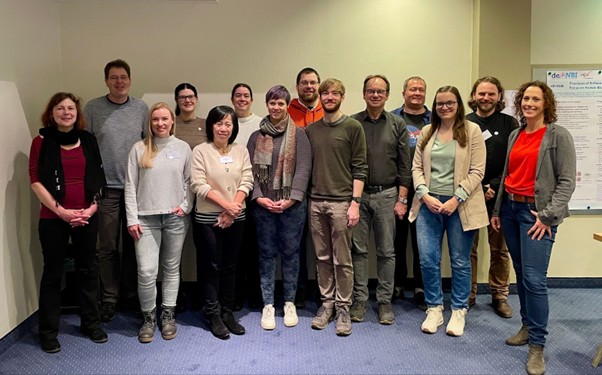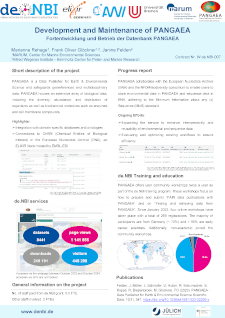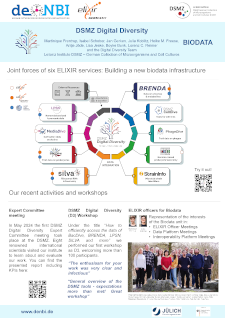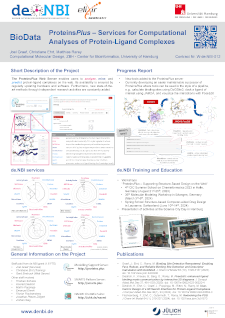Center for Biological Data (BioData)
 The staff of the Service Center "Center for Biological Data" (BioData)
The staff of the Service Center "Center for Biological Data" (BioData)de.NBI Services offered by BioData de.NBI Training offered by BioData
About
The Center for Biological Data consists of six information systems: SILVA, PANGAEA, BacDive, LPSN, ProteinsPlus and BRENDA. Together they provide access to and services for ribosomal RNA genes from all three domains of life (SILVA), georeferenced data from earth system research (PANGAEA), detailed strain-linked information on the different aspects of bacterial and archaeal biodiversity (BacDive), up-to-date prokaryotic nomenclature (LPSN), easily accessible protein structure data (ProteinsPlus) as well as comprehensive information on enzymes (BRENDA). All information systems provide a set of highly curated reference datasets and some of the databases have been maintained for more than 25 years, indicating the importance of quality-controlled reference datasets for the advancement in science.
Services
A core mission of the information system providers is to offer high-quality datasets and related services for users in academia and industry. SILVA, BacDive and BRENDA have been identified as ELIXIR Core Data Resources underlining their fundamental importance to the wider life-science community and the long-term preservation of biological data in Europe and beyond.
SILVA
https://www.arb-silva.de
SILVA offers quality-controlled, curated ribosomal RNA (rRNA) gene alignments, taxonomies, and reference databases for Bacteria, Archaea and Eukarya. Services offered on the SILVA website are the rRNA gene aligner, classifier, tree calculation and visualisation tool as well as tools for probe and primer evaluation. Further online services include advanced browsing, searching, and download of pre-configured, as well as user generated datasets for individual post-processing. SILVAngs provides fast and accurate taxonomic classification of next generation amplicon data.
BRENDA
https://www.brenda-enzymes.org/
BRENDA is the world’s most comprehensive enzyme information system, encompassing functional and molecular data on enzymes and ligands across all domains of life. Developed at the Leibniz Institute DSMZ, it has been recognized as an ELIXIR Core Data Resource (since 2018) and a Global Core Biodata Resource (since 2022). BRENDA offers advanced search functionalities, data visualization, and evaluation tools, supporting detailed analysis of enzyme properties. Its core dataset, based on ~176,000 literature references, includes ~5.8 million manually curated experimental data points on ~112,000 enzymes and ~278,000 ligands from ~15,000 organisms. Supplementary data is integrated using text mining, prediction algorithms, and external resources. In 2023, BRENDA joined the DSMZ Digital Diversity Initiative, enabling greater interoperability and linking with other major databases such as SILVA, BacDive, and LPSN.
BacDive
https://bacdive.dsmz.de/
The Bacterial Diversity Database BacDive is the worldwide largest knowledge base of standardized bacterial information. It has been selected as an ELIXIR Core Data Resource as well as a Global Core Biodata Resource. Its mission is to mobilize and make freely available strain-level research data from various sources. Major sources are internal files from culture collections (e.g. CABI, CCUG, CIP, DSMZ, JCM, KCTC) and extensive data manually extracted from species descriptions. Today, BacDive offers 2.6 million data points on 97,334 strains, including 20,060 type strains. Over 1000 data fields cover the topics taxonomy, morphology, physiology, metabolism, origin, biosafety, sequence data, and cultivation. Powerful tools such as the Advanced Search or the Isolation Source Search allow users to easily find strains based on their characteristics, e.g. strains that grow under certain conditions or strains isolated from a specific environment. The RESTful API and a SPARQL endpoint provide expert access to perform large-scale analysis on knowledge provided by BacDive.
LPSN
https://lpsn.dsmz.de/
The List of Prokaryotic names with Standing in Nomenclature (LPSN) provides weekly updated comprehensive information on the nomenclature of prokaryotes and related data. This includes, for each name, nomenclatural type, taxonomic and nomenclatural status, synonymy, etymology, literature, type strains, 16S rRNA gene and genome sequences, and a wealth of background information. LPSN was introduced over two decades ago by an individual microbiologist as a manually curated database. In 2020, LPSN was newly published after moving to the Leibniz Institute DSMZ, based on a dedicated database infrastructure including automated data import routines, a database-driven, user-friendly web page, an Application Programming Interface (API), and a plethora of content-related additions. As of April 2025, LPSN covers all prokaryote names validly published or pro-validly published under the ICNP, almost all cyanobacteria names validly published under the botanical code, and many not validly published names that could be traced to their literature source.
ProteinsPlus
https://proteins.plus
ProteinsPlus is a web service that provides easy-to-use tools to analyze macromolecular structures from the Protein Data Bank (PDB), the AlphaFold Database, or individually uploaded structures of proteins and protein-ligand complexes. Several services for structure-based similarity searches and protein preprocessing for follow-up modelling studies are provided. Besides the visual analysis of structural data, ProteinsPlus enables structure profiling such as comparisons to the experimental electron density, structure preprocessing like determination of tautomeric and protonation states, including hydrogen atom orientation, structure analysis like detection and mining of binding sites, searching for and superimposing similar binding sites, or metal coordination analysis.
PANGAEA
https://www.pangaea.de/
PANGAEA - Data Publisher for Earth & Environmental Science - operates as an open-access library for archiving, publishing, and disseminating georeferenced data from the Earth, environmental, and biodiversity sciences. It holds a mandate from the World Meteorological Organization (WMO) and is accredited as a World Radiation Monitoring Center (WRMC). Additionally, PANGAEA was recognized as a World Data Center by the International Council for Science (ICS) in 2001 and has been certified with the CoreTrustSeal since 2019.
Essential services provided by PANGAEA include data curation, long-term data archiving, and data publication. Data curation involves quality control of metadata and the development of ontologies and vocabularies in accordance with international protocols and standards. Each dataset is assigned a universally unique Digital Object Identifier (DOI), allowing for proper citation. Both metadata and data are accessible via the PANGAEA website and through web services.
Project Management
BacDive: The Bacterial Diversity Metadatabase
Dr. Lorenz Reimer (Service Center Coordinator)
Leibniz Institut DSMZ-Deutsche Sammlung von Mikroorganismen und Zellkulturen GmbH
Inhoffenstraße 7B
38124 Braunschweig
Database email:
SILVA: The ribosomal RNA database Website
Dr. Lorenz Reimer
Leibniz Institut DSMZ-Deutsche Sammlung von Mikroorganismen und Zellkulturen GmbH
Inhoffenstraße 7B
38124 Braunschweig
Database email:
PANGAEA: Environmental Data Integration and Data Publication
Dr. Janine Felden
Prof. Dr. Frank Oliver Glöckner
MARUM-Center for Marine Environmental Sciences
University Bremen
Mary-Somerville-Str. 2-4
28359 Bremen
Database email:
BRENDA: The Comprehensive Enzyme Information System
Dr. Boyke Bunk
Leibniz Institut DSMZ-Deutsche Sammlung von Mikroorganismen und Zellkulturen GmbH
Inhoffenstraße 7B
38124 Braunschweig
Database email:
LPSN: List of Prokaryotic Names with Standing in Nomenclature
Dr. Markus Göker
Leibniz Institut DSMZ-Deutsche Sammlung von Mikroorganismen und Zellkulturen GmbH
Inhoffenstraße 7B
38124 Braunschweig
ProteinsPlus: A common framework to make computational tools for structure-based molecular design
Prof. Dr. Matthias Rarey
Zentrum für Bioinformatik
Universität Hamburg
Albert-Einstein-Ring 8-10
22761 Hamburg
Database email:
Posters




